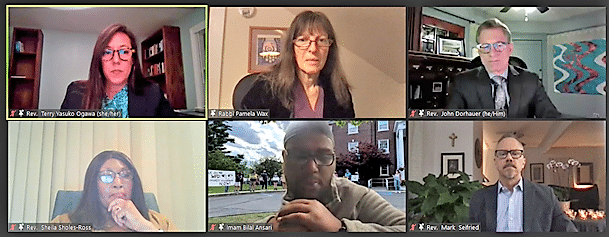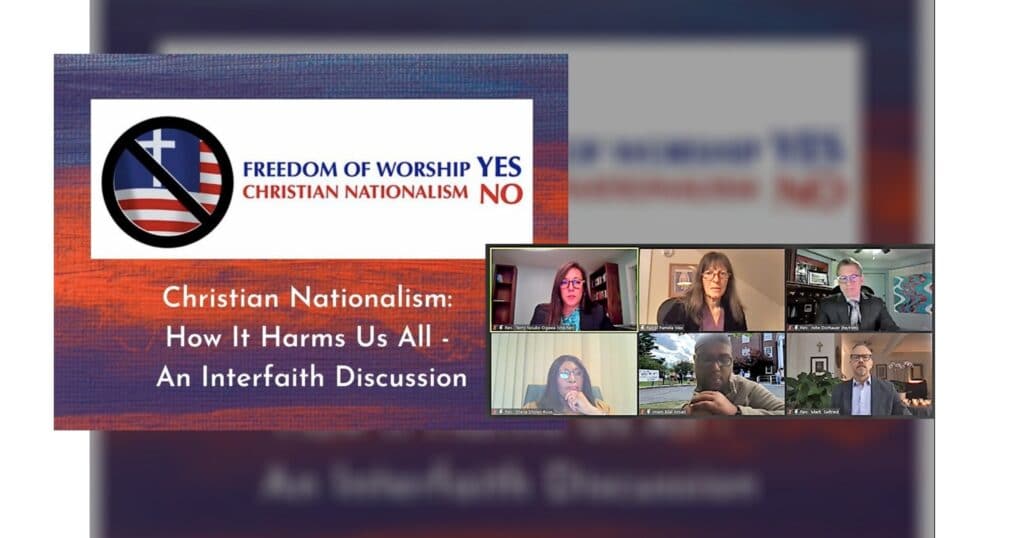Christian nationalism — an oxymoron — is nonetheless powerful, panelists warn
Christian nationalism is false. It is dangerous.
And it has more influence in U.S. systems of power than many people realize.
Those were some of the key points made by panelists from three faith backgrounds in a March 18 webinar.
First Congregational Church, United Church of Christ, Williamstown, Mass., hosted “Christian Nationalism: How it Harms Us All.” The UCC’s Southern New England Conference and the Massachusetts-based 4 Freedoms Coalition also sponsored it. A video recording is available now on Vimeo.
What Christian nationalism is

The Rev. Mark Seifried, First Congregational’s interim minister, opened by defining nationalism, then Christian nationalism.
Nationalism, he said:
- “Starts with the assumption that everyone already belongs in distinct groups that are defined by religion, culture, ethnicity or race.”
- Seeks “a government that will promote a single cultural identity.”
- When in power, excludes “dissidents, minority religions or secularists who do not conform to the majority’s ethical and cultural norms” and treats them as second-class citizens.
- Uses “violent and oppressive practices” against nonconformists if they resist.
Seifried said Christian nationalism in the U.S.:
- “Assumes that we are already a Christian nation” and should be, “despite the fact that freedom of religion is part of the U.S. Constitution.”
- Seeks to enlist government “to enforce laws that privilege a version of Christianity.”
- Embraces a faith “that is complicit in racial, ethnic, religious and gender discrimination.”
‘Contradiction in terms’
In prerecorded remarks, the Rev. Michael Curry, presiding bishop of The Episcopal Church in the U.S., called such a belief system “a contradiction in terms.” He quoted from the Gospel of John, in which Jesus says, “My kingdom is not of this world.”
“Any close alliance between Christian teachings that seek to follow the ways of Jesus of Nazareth and any empire of this world, any nation or race, is a false union,” Curry said. Rather, he said, “Love is the supreme law of God. It is the way of Jesus. It is the way of those who follow Jesus.”
“That is not to say that a Christian cannot be a good patriot,” Curry said. “Indeed, I love our country. I love it enough that I won’t let it continue to do wrong when I think it is hurting and harming. But that’s patriotism. Nationalism tends to exclude. … Nationalism is about us over everyone else. Nationalism is about supremacy. The only supremacy that a Christian can follow is the supremacy of love — to love God, the neighbor and yourself.”
‘They want total control’
“They want the Bible to be the template for all laws written.”
UCC General Minister and President John Dorhauer
“We need to be aware of two things regarding those who espouse this Christian Nationalist ideology,” said the Rev. John Dorhauer, general minister and president of the UCC.
“First, they want nothing less than total control of the United States and its government. They want the Bible to be the template for all laws written. They want only those who espouse a very narrow view of a very conservative theology to be in power.
“Second, they are far more effective at undertaking this than we assume. They have been supporting candidates who have been winning elections for decades now, and who remain beholden to them – proving themselves willing to go to extremes they heretofore had no interest in pursuing but now will do so because of the power that Christian Nationalists hold over them.”
To counter the racism and intolerance of Christian nationalism, progressive people of faith should examine their own traditions for vestiges of racism, Dorhauer said. And there are actions they can take — including voting, and pushing for laws that protect and expand voting rights.
“We have to mitigate their ability to change our laws and our courts.”
UCC General Minister and President John Dorhauer
He mentioned, for example, the For the People Act (H.R. 1), which has passed the U.S. House of Representatives and awaits Senate action. He called it “maybe the most important piece of legislation for this generation.”
“The people that we elect will determine for the next generation or two what laws are passed and what laws are upheld – and voting is absolutely critical,” Dorhauer said. White nationalists, he said, are “not going to disappear and we’re not going to change their minds, but we have to organize in ways that mitigate their ability to change our laws and change our courts.”
‘Scripture out of context’
Also on the panel were:
- Imam Bilal Ansari, director of the Islamic Chaplaincy Program at Hartford (Conn.) Seminary, and assistant vice president for campus engagement at Williams College in Williamstown.
- The Rev. Sheila Sholes-Ross, senior pastor, First Baptist Church, Pittsfield, Mass., and founder and co-chair of Equity for Women in the Church.
- Rabbi Pamela Wax, spiritual care director, Westchester Jewish Community Services, White Plains, N.Y.
“There is no longer a reason to doubt who these people are.”
UCC General Minister and President John Dorhauer
The Rev. Terry Yasuko Ogawa of the Southern New England Conference staff moderated a question-and-answer session.
The 90-minute discussion also covered, among other things:
- Christianity’s historic role in U.S. racism.
- Christian nationalism as just one piece of what Wax described as a “contorted Venn diagram of hatred and falsehoods” — decades old, but now fueled by social media.
- What it means to self-identify as “white.”
- Differences between nationalism and patriotism.
But the conversation returned repeatedly to what Sholes-Ross described as the “oxymoron” of Christian nationalism — and its followers’ tendency, as she put it, to “take scripture out of context to fit their nationalist aims.”
“There is no longer a reason to doubt who these people are, what they want, and how far they are willing to go to achieve their ends,” Dorhauer said. “It is long past the time that we learn all we can about who they are, what they have accomplished, what they hope yet to accomplish, and what we must do to reverse their course before it is too late.”
Related News
A Prophetic Call for Justice and Peace in Palestine
The executive leaders of the United Church of Christ have issued the following statement...
Read More‘Love is Greater Than Fear’: Regional Youth Events get to the heart of gospel message
United Church of Christ teens attending this summer’s Regional Youth Events (RYE) are...
Read MoreUCC desk calendars available to order now
Prepare for your day, month and year with the United Church of Christ desk calendar —...
Read More


